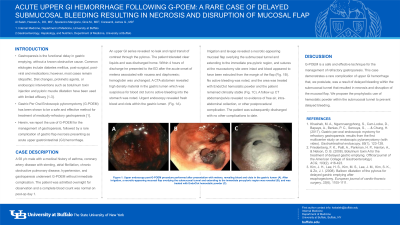Monday Poster Session
Category: GI Bleeding
P2497 - Acute Upper GI Hemorrhage Following G-POEM: A Rare Case Of Delayed Submucosal Bleeding Resulting in Necrosis and Disruption of Mucosal Flap
Monday, October 28, 2024
10:30 AM - 4:00 PM ET
Location: Exhibit Hall E

Has Audio

Hassan Ali Al Saleh, DO, MS
University at Buffalo
Buffalo, NY
Presenting Author(s)
Hassan Ali Al Saleh, DO, MS1, Gina M. Sparacino Mangione, MD1, James G. Corasanti, MD, PhD2
1University at Buffalo, Buffalo, NY; 2Buffalo General Medical Center/SUNY, Getzville, NY
Introduction: Gastroparesis is the functional delay in gastric emptying, without a known obstructive cause. Common etiologies include diabetes mellitus, post-surgical, post-viral and medications; however, most cases remain idiopathic. Diet changes, prokinetic agents, or endoscopic interventions such as botulinum toxin injection and pyloric muscle dilatation have been used with limited efficacy. Gastric Per Oral Endoscopic pyloromyotomy (G-POEM) has been shown to be a safe and effective method for treatment of medically-refractory gastroparesis. Herein, we report the use of G-POEM for the management of gastroparesis, followed by a rare complication of gastric flap necrosis presenting as acute upper GI hemorrhage.
Case Description/Methods: A 58 yo male with a history of asthma, CAD with stenting, atrial fibrillation, COPD, hypertension, and gastroparesis underwent G-POEM without immediate complication. The patient was admitted overnight for observation and CBC was normal on POD 1. An upper GI series revealed no leak and rapid transit of contrast through the pylorus. The patient tolerated clear liquids and discharged home. Within 4 hours of discharge he presented with an acute onset of melena associated with nausea and diaphoresis; hemoglobin was unchanged. CTA abdomen revealed high density material in the gastric lumen which was suspicious for blood clot but no active bleeding into the stomach was noted. Urgent endoscopy revealed fresh blood and clots within the gastric lumen (Fig. 1A). Irrigation and lavage revealed a necrotic-appearing mucosal flap overlying the submucosal tunnel and extending to the immediate pre-pyloric region, and sutures at the mucosotomy site were intact and blood appeared to have been extruded from the margin of the flap (Fig. 1B). No active bleeding was noted. The area was treated with EndoClot hemostatic powder and the patient remained clinically stable (Fig. 1C). A follow up CT abdomen revealed no evidence of free air, intra-abdominal collection, or other postprocedural complication. The patient was subsequently discharged with no complications to date.
Discussion: G-POEM is a safe and effective technique for the management of refractory gastroparesis. This case demonstrates a rare complication of upper GI hemorrhage that, we postulate, was a result from delayed bleeding within the submucosal tunnel resulted in necrosis and disruption of the mucosal flap. We propose the prophylactic use of hemostatic powder within the submucosal tunnel to prevent delayed bleeding.

Disclosures:
Hassan Ali Al Saleh, DO, MS1, Gina M. Sparacino Mangione, MD1, James G. Corasanti, MD, PhD2. P2497 - Acute Upper GI Hemorrhage Following G-POEM: A Rare Case Of Delayed Submucosal Bleeding Resulting in Necrosis and Disruption of Mucosal Flap, ACG 2024 Annual Scientific Meeting Abstracts. Philadelphia, PA: American College of Gastroenterology.
1University at Buffalo, Buffalo, NY; 2Buffalo General Medical Center/SUNY, Getzville, NY
Introduction: Gastroparesis is the functional delay in gastric emptying, without a known obstructive cause. Common etiologies include diabetes mellitus, post-surgical, post-viral and medications; however, most cases remain idiopathic. Diet changes, prokinetic agents, or endoscopic interventions such as botulinum toxin injection and pyloric muscle dilatation have been used with limited efficacy. Gastric Per Oral Endoscopic pyloromyotomy (G-POEM) has been shown to be a safe and effective method for treatment of medically-refractory gastroparesis. Herein, we report the use of G-POEM for the management of gastroparesis, followed by a rare complication of gastric flap necrosis presenting as acute upper GI hemorrhage.
Case Description/Methods: A 58 yo male with a history of asthma, CAD with stenting, atrial fibrillation, COPD, hypertension, and gastroparesis underwent G-POEM without immediate complication. The patient was admitted overnight for observation and CBC was normal on POD 1. An upper GI series revealed no leak and rapid transit of contrast through the pylorus. The patient tolerated clear liquids and discharged home. Within 4 hours of discharge he presented with an acute onset of melena associated with nausea and diaphoresis; hemoglobin was unchanged. CTA abdomen revealed high density material in the gastric lumen which was suspicious for blood clot but no active bleeding into the stomach was noted. Urgent endoscopy revealed fresh blood and clots within the gastric lumen (Fig. 1A). Irrigation and lavage revealed a necrotic-appearing mucosal flap overlying the submucosal tunnel and extending to the immediate pre-pyloric region, and sutures at the mucosotomy site were intact and blood appeared to have been extruded from the margin of the flap (Fig. 1B). No active bleeding was noted. The area was treated with EndoClot hemostatic powder and the patient remained clinically stable (Fig. 1C). A follow up CT abdomen revealed no evidence of free air, intra-abdominal collection, or other postprocedural complication. The patient was subsequently discharged with no complications to date.
Discussion: G-POEM is a safe and effective technique for the management of refractory gastroparesis. This case demonstrates a rare complication of upper GI hemorrhage that, we postulate, was a result from delayed bleeding within the submucosal tunnel resulted in necrosis and disruption of the mucosal flap. We propose the prophylactic use of hemostatic powder within the submucosal tunnel to prevent delayed bleeding.

Figure: Figure 1. Upper endoscopy post-G-POEM procedure performed after presentation with melena, revealing blood and clots in the gastric lumen (A). After irrigation, a necrotic-appearing mucosal flap overlying the submucosal tunnel and extending to the immediate pre-pyloric region was revealed (B), and was treated with EndoClot hemostatic powder (C).
Disclosures:
Hassan Ali Al Saleh indicated no relevant financial relationships.
Gina Sparacino Mangione indicated no relevant financial relationships.
James Corasanti indicated no relevant financial relationships.
Hassan Ali Al Saleh, DO, MS1, Gina M. Sparacino Mangione, MD1, James G. Corasanti, MD, PhD2. P2497 - Acute Upper GI Hemorrhage Following G-POEM: A Rare Case Of Delayed Submucosal Bleeding Resulting in Necrosis and Disruption of Mucosal Flap, ACG 2024 Annual Scientific Meeting Abstracts. Philadelphia, PA: American College of Gastroenterology.
